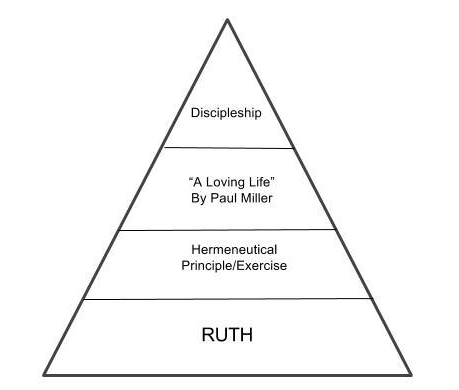The more settled my convictions became that authority and submission are not ontological absolutes, the more I wanted to understand the theological foundations of Dr. MacArthur’s perspective. That study sent me down two connected, but distinct paths.
1. The Eternal Subordination of the Son
One of Doctor MacArthur’s notable qualities is the constancy of his convictions. Said differently, he rarely changes his position on anything. On the occasion of the one notable time he did change his mind, he wrote about it here.
Dr. MacArthur once believed that Jesus was not eternally God’s Son, but that he became God’s Son through the incarnation. In this article published in JBMW in 2001, he explains how he came to change his mind, and to believe that Jesus’s “sonship” is eternal. Elsewhere, he describes the nature of Jesus’ sonship as eternally obedient, or submissive. Consequently, through Jesus’ relationship with His father as a Son, He is eternally submissive or subordinate to His Father.
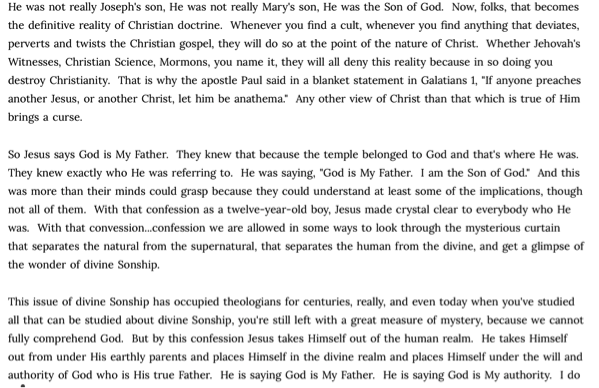
https://www.gty.org/library/sermons-library/42-34/the-amazing-child-who-was-god-part-3
This argument will be familiar to those who followed the Internet debate several years ago over the doctrine described variously as ESS (Eternal Subordination of the Son), EFS (Eternal Functional Subordination), or ERAS (Eternal Relationship of Authority and Submission). The controversy ignited partly because a group of Reformed women writers, including myself, had traced varying threads of problematic teaching in women’s’ Bible study materials back to this same place. It’s a position held by other conservative theologians, such as Wayne Grudem. It’s also a position many other conservative theologians argue is unorthodox, outside the bounds of the Nicene Creed.
2. The pronoun attached to “authority” in Romans 13
Modern English translations take two approaches to interpreting the pronoun that represents “authority” in Romans 13: 4. The NKJV uses “he”, as does the ESV. But the NASB uses “it”, and so does the CSB. It’s a distinction with a difference worth considering.
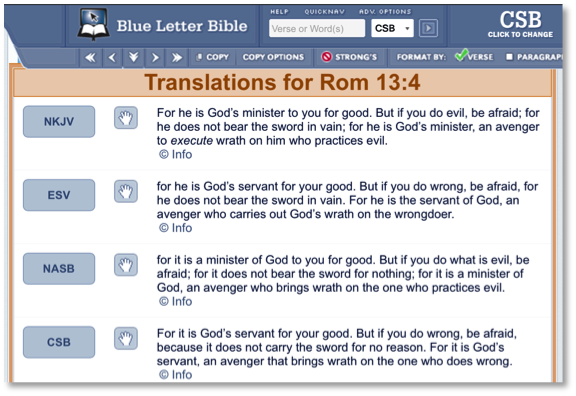
Dr. MacArthur’s remarks at the GTY blog were far from the first time he has used Romans 13 as the textual lens through which to interpret contemporary issues related to civil authority.
Romans 13 was the leading passage for a sermon he preached at a special Sunday morning service to honor the LAPD in the wake of the first wave of Black Lives Matter activism in 2015.
It was a featured passage (alongside 1 Peter 3) in a sermon series he preached after the LA riots in 1992.
It was the leading passage in a sermon he preached in the aftermath of the LAPD’s aggressive arrests of pro-life protestors in 1985.
Over the years, Dr. MacArthur has read this verse from different English translations. But when he expounds on it, he invariably equates authority with the people – the men – possessing it.
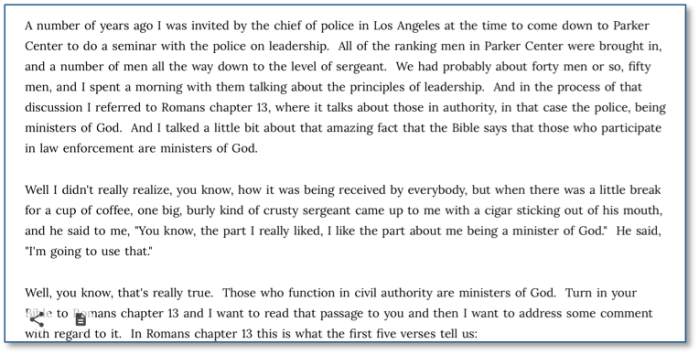
https://www.gty.org/library/sermons-library/80-162/obeying-civil-authorities
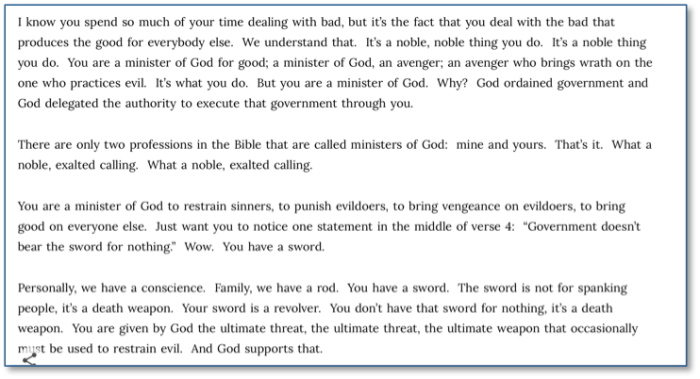
https://www.gty.org/library/sermons-library/80-419/how-god-restrains-evil-in-the-world
The belief that authority and submission are ontological absolutes rooted in ESS and in gender will invariably shape the way you view any number of issues our country is focused on today – domestic abuse, clerical abuse, sexual abuse, police brutality, and civil disobedience.
It will shape the way you interpret America’s troubling legacy of slavery and segregation, its lingering effects, and the Protestant church’s passive complicity and active participation in it.
It will justify telling a sanctuary full of police officers on a Sunday morning that they’re ministers of God, without telling them that they’re also sinners who rebel against God’s authority, especially when they abuse their authority or knowingly cover up its abuse by others. It will have them leave the service ignorant of their accountability and culpability, instead of convicted and driven to repentance and restoration through Christ, the one to whom all authority has been given by His Father.
Now, Dr. MacArthur’s arguments about absolute authority and submission are being put to the ultimate test, as the two institutions he leads are themselves accused of not submitting to civil authorities. The charges vary in type and in degree, but their unifying theme is that the leadership of TMU and TMS has repeatedly chosen to do or not do things required by federal law for them to be fully accredited. Ironically, many of the requirements in question are designed to properly contain authority and ensure that it is properly distributed and not misused. These are the issues they must address and make right to have their accreditation restored.
It remains to be seen Dr. MacArthur and the administration of TMU/S will submit to these mandates – whether they will recognize the damage this belief in absolute authority and submission has done to their institutions, let alone the hundreds and even thousands of men and women who have served and been taught in them.
The damage is not just from the doctrine itself. It’s the way Dr. MacArthur is drawing a line from this doctrine to differing Christian perspectives about how to faithfully pursue justice like Christ, and calling those perspectives a danger to the gospel. It implies that pastors who are attempting to faithfully shepherd their congregations to better align their understanding of justice with Christ are somehow going “off message”. It implies that church members who humbly raise these issues with their elders and pastors or other church members are somehow sowing division, instead of pursuing greater faithfulness to Christ.
I have watched over the last several years as the different branches of my spiritual family – my GCC family, my TMU family, my local church family, my Christian Internet family – are not just growing apart from each other, but growing antagonistic and suspicious of one another’s fidelity to the gospel. There is a dividing wall of hostility being built against those who are working to tear it down in the name of the One who put such hostility to death on the cross (Ephesians 2).
What I am thankful for, in the midst of the shame of our factiousness playing out in front of a watching world, it has no power to defeat the actual gospel. As my pastor, Josh Camacho, wrote to me when I wrote to him about all this last week:
“There is no legitimate threat to the gospel, there is no worthy opponent to the gospel; the gospel has outlasted empires, emperors, and will outlast immortal creatures that defy it. The gospel is the power of God unto salvation to those who believe and it is marching forth to the ends of the earth by the Sovereign will of Christ who is determined to build His church by the regenerating and renewing power of the Holy Spirit. The gospel will be fine. We might get ourselves into trouble…but the God who offered His only begotten Son for sinners will not be thrown aside by errant theology.”
And to him and to all of us, I say “Yes and amen.”



